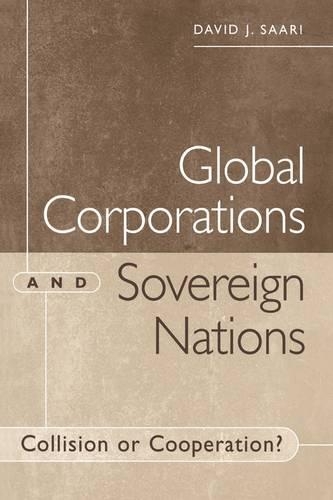
Global Corporations and Sovereign Nations: Collision or Cooperation
(Hardback)
Publishing Details
Global Corporations and Sovereign Nations: Collision or Cooperation
By (Author) David J. Saari
Bloomsbury Publishing PLC
Praeger Publishers Inc
30th May 1999
United States
Classifications
Tertiary Education
Non Fiction
Industry and industrial studies
Economic theory and philosophy
338.74
Physical Properties
Hardback
376
Description
Should 185 sovereign nations allow 750 giant corporations to invest corporate profits as they alone see fit, or must public authority be mobilized to protect public interest by reining in these economic behemoths as they roam the global markets By integrating many fields of knowledge and bringing to bear their disparate viewpoints, Dr. Saari makes his own viewpoint clear: The people did not elect investment bankers and CEOs, and neither group represents the people and the public interest. His book is a compelling argument for offering others a place at the table and for giving them a voice in deciding how billions in world currencies should be spent or invested. Comprehensive, multidisciplinary, empirical and analytical, Dr. Saari gives a coherent, reliable examination of the many pressure points between globalizing corporations and the nations in which they are embedded (and to which perhaps they should be indebted). Dr. Saari's exploration takes into account a variety of eactors: popular national sovereignty, the variable definitions of capitalism, clashing views on the need for foreign trade, corporate practices like labor downsizing in home nations and their growing labor, tax, and regulatory problems. He makes three key points: (1) Regulated capitalism by nations is a viable public control system to shape the investment choices of giant corporations in such a way as to include the public interest; (2) Popular sovereignty in a democratic society directs all subunits of that society. Corporations must be separate from the state and subordinate to it; and (3) Most nation-states need to cooperate more fully to regulate, in a globally coordinated way, the global actions of giant coporations, especially with regard to decisions on direct foreign capital investment. Meticulously documented, with a comprehensive bibliography and two important appendices, Dr. Saari's book is essential for scholars and students in a wide range of academic disciplines, and for their colleagues in policy making capacities throughout government and the world's growing and ever more global corporations.
Reviews
"David Saari's timely study is sure to stimulate debate. He is asking vitally important questions about the changing balance of power between corporations and legitimate public authority in a globalizing economy. His interdisciplinary research usefully pushes forward the search for answers."-Louis W. Pauly Director, Centre for International Studies University of Toronto
Thus, for one seeking useful guidance about what has or may work/fail, or the degree to which state sovereignty is jeopardized by modern corporate growth, this book is a useful critique of the salient features of any program which might seek to "reign in" what may effectively be a not-so-visible branch of the international legal order.-American Society of International Law
"Thus, for one seeking useful guidance about what has or may work/fail, or the degree to which state sovereignty is jeopardized by modern corporate growth, this book is a useful critique of the salient features of any program which might seek to "reign in" what may effectively be a not-so-visible branch of the international legal order."-American Society of International Law
Author Bio
DAVID J. SAARI has taught in the School of Public Affairs, American University, Washington, D.C. for more than 25 years. He also consults for management in government and industry. Among his many articles and books are Too Much Liberty Perspectives on Freedom and the American Dream (Praeger, 1995), The Court and Free-Lance Reporter Profession: Improved Management Strategies (Quorum, 1988), and American Court Management: Theories and Practices (Quorum, 1982).
